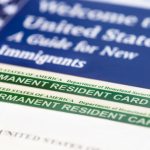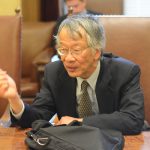Meet new ACRS Recovery Services Director Leslie Stone
Leslie Stone joined ACRS in June 2020 as the agency’s new Recovery Services Director. Leslie began her career at ACRS in 2008 until 2015 and returns after five years working with Pioneer Human Services, Mukleshoot Indian Tribe, and Cowlitz Tribal Health. Previous Recovery Services Director Victor Loo has transitioned fully into his new role as ACRS’ Practice Innovation Director, a position created to prepare the agency for integrated managed care (IMC).
Can you share a little about yourself and your professional path before coming to ACRS?
I am a Vietnamese-American woman raised in Spokane, Washington, until moving to the western side of the state after college. I hold a Substance Use Disorder Professional (SUDP) license through the State of Washington, and I earned my Bachelor’s degree in Psychology in 2006 from Eastern Washington University. During my undergrad program, I completed internships at Eastern State Hospital and Spokane County Juvenile Court.
I am a “boomerang” as I began my career in the SUD field at ACRS in the RS department for seven and a half years. In 2015, I left ACRS to take on a Program Manager position at Pioneer Human Services managing both BiCorp Intensive Inpatient and Seattle Outpatient treatment programs. In 2016, I began a Suboxone Counselor specific position at Muckleshoot Indian Tribe’s Behavioral Health for their Medically Assisted Treatment program. I left my former position as the Program Manager for the SUD Program at Cowlitz Tribal Health in Tukwila to return to ACRS in June 2020.
What motivated you to come back to ACRS?
I am super excited to “come back home” to ACRS, where I have made close friendships for life and can continue to serve the AAPI community. I’ve always known I would come back, and I am honored to do so as the Director of Recovery Services. I am passionate about social justice efforts and healing our community. When I first discovered ACRS in 2008, I thought it was amazing there was an agency to help our AAPI population. I grew up in a neighborhood that was not very diverse, with myself and my siblings being among the few Asians at schools we attended. In high school, I and some Asian classmates (one other Hmong family and my own brother) began an Asian group, where we could talk about our challenges as Asian youth. I know the impact this had on me; the feeling of belonging and community is extremely important. ACRS provides this sense of belonging to our communities.
What has influenced and inspired you and the work you do?
My father is in recovery for 42 years. He spoke to me often from a young age about the journey he experienced. He was also a drug and alcohol counselor back in the days when a license was not needed. That planted the seed of starting my career at ACRS in the SUD field. I realized my passion through witnessing clients’ healing journey. Seeing them make positive life changes, finding a job, securing housing, building stronger bonds with their families, speaking up and advocating in their community – all of it inspires me to do this work. I have hope for every single person who walks through our doors and what ACRS provides for our communities. Often our clients come to us during a difficult stage of their lives and may experience shame or guilt. It is our dedication to empower our clients because they are part of our community and they have a voice.
Another influence and inspiration is my mother. She arrived in the United States in 1971 from Vietnam, before the war ended. She was isolated from her culture and her people for so long and tried to assimilate to American culture. I have observed the impact this has had on her life, as well as my own. So again, I am thankful there is a place like ACRS for immigrants and refugees, as well as American born, to find some respite, community identity, involvement and support.
What is your philosophy toward recovery and healing?
My philosophy toward recovery and healing is holistic. A person must identify the areas in their life that are off-balance and focus on those areas as a priority to work on, taking steps as they can. I learned the Medicine Wheel while attending classes for my SUDP (previously CDP) at Northwest Indian College and working at ACRS. This is a Native American teaching I was taught by one of my mentors, Leo Whiteford; however, it can be applied in all communities for healing, addressing the Mental/Emotional, Physical, Social/Cultural, and most importantly, Spiritual realms of the whole being. It is also important to meet a client where they are at and assess how do we as counselors and therapists help them in moving toward their goals.
I also believe culture is extremely important to incorporate into the services we provide. Inherently, we as humans are tribal and we heal best when we can be together with our people connecting in a culturally rich and spiritual way.
What is your focus and priorities as the new director of Recovery Services?
My initial focus as the new director of Recovery Services will be learning, listening, and connecting. Learning more about the people in RS is very important to me. I am inspired to help people develop holistically so they can be balanced and at their best for our community and those we serve. The work we do is extremely rewarding, but it’s also hard and can be emotionally taxing. Tending to how people are feeling helps maintain balance so we can all show up and stay supportive.
While meeting and learning individual people, I’ll also be focused on learning the teams and systems the teams operate within RS and the agency. I’m naturally very curious, so I’ll be listening and asking many questions to gain a better understanding of risks, preferences, needs, opportunities and challenges. While learning and listening, my hope and goal are that the connections and rapport established be positive, healthy and productive.
My priorities are focused on:
- Building on my predecessor Victor Loo’s legacy and nurturing a healthy work culture
- Learning the needs of the Recovery Services team and the communities we serve
- Learning the systems, policies, structure, and expectations of RS in general
- Helping the programs adapt to current challenges while planning for the future
While I gain my footing, some questions I keep in mind are:
- How do we bridge the gap in social determinants of health?
- Since the AAPI community is made up of different and distinct communities, what’s the best way to prioritize needs?
- How can we help those in our communities meet basic needs so they can focus on their overall wellness?
When you’re not working, what would you likely be doing?
I enjoy spending quality time with my partner, Kendrick, two daughters Jazmine, 21, and Amya, 16, and two cats. My hobbies include hot yoga, hiking, cooking, meditation and gardening. I enjoy participating in social justice and advocacy efforts, such as the Women’s March, community charity events, and attending Legislative forums when possible.
I also enjoy spending quality time with my “family” whom are friends I have met throughout my life and have chosen. Unfortunately I don’t have many family members here in the States, so I consider my closest friends, many I have met here at ACRS, to be my family. So of course, we love to eat a fabulous meal together!






